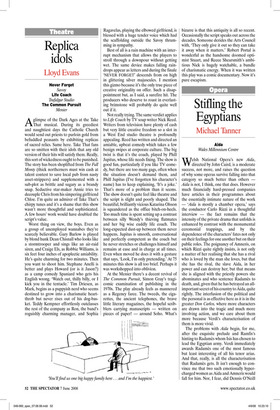Replica idols
Lloyd Evans
Never Forget Savoy Life Coach Trafalgar Studio The Common Pursuit Menier
Aglimpse of the Dark Ages at the Take That musical. During its greediest and naughtiest days the Catholic Church would send out priests to purloin gold from befuddled peasants by exhibiting replicas of sacred relics. Same here. Take That fans are so smitten with their idols that any old version of their hits will satisfy them. Really, this sort of wickedness ought to be punished. The story has been shoplifted from The Full Monty (thick northerners must win cash at talent contest to save local pub from nasty asset-strippers) and supplemented with a sub-plot as brittle and sugary as a brandy snap. Seductive star-maker Annie tries to decouple Chris from his simpering girlfriend Chloe. I’m quite an admirer of Take That’s chirpy tunes and it’s a shame that this show wasn’t more thoughtful and sophisticated. A few hours’ work would have doubled the script’s value.
Worst thing on view, the boys. Even as a group of unemployed wannabes they’re scarcely believable. Gary Barlow is played by blond hunk Dean Chisnall who looks like a stormtrooper and sings like an air-raid siren, and Craige Els, as Robbie Williams, is six feet four inches of apoplectic amiability. He’s quite charming for two minutes. Then you want to shoot him. Stephane Anelli is better and plays Howard (or is it Jason?) as a camp comedy Spaniard who gets his English wrong. ‘Watch out, thilly billy, or I kick you in the tentacle.’ Tim Driesen, as Mark, begins as a puppyish nerd who seems destined to grow into a charismatic heartthrob but never rises out of his dog-basket. Teddy Kempner effortlessly outclasses the rest of the company as Ron, the band’s roguishly charming manager, and Sophia Ragavelas, playing the elbowed girlfriend, is blessed with a huge tender voice which had the scaffolding outside the Savoy thrumming in sympathy.
Best of all is a rain machine with an interrupt mechanism that allows the players to stroll through a downpour without getting wet. The same device makes falling raindrops appear as letters and during the finale ‘NEVER FORGET’ descends from on high in glittering silver majuscules. I mention this gizmo because it’s the only true piece of creative originality on offer. Such a disappointment but, as I said, a surefire hit. The producers who deserve to roast in everlasting brimstone will probably do quite well out if it.
Not really trying. The same verdict applies to Life Coach by TV soap writer Nick Reed. Writers from television have plenty of cash but very little creative freedom so a slot in a West End studio theatre is profoundly appealing. Reed has written and directed an amiable, upbeat comedy which takes a few benign swipes at corporate culture. The big twist is that it’s the coach, played by Phill Jupitus, whose life needs fixing. The show is good fun, particularly if you like TV comedy, but there are too many gags, often when the situation doesn’t demand them, and Phill Jupitus (I’ve forgotten his character’s name) has to keep explaining, ‘It’s a joke.’ That’s more of a problem than it seems. The show doesn’t quite feel like theatre and the script is slight and poorly shaped. The beautiful, brilliantly vicious Katarina Olsson is squandered as the office bitch-on-heels. Too much time is spent setting up a contrast between silly Wendy’s thieving flatmates and her big wise cuddly life coach. The long-expected dust-up between them never happens. Jupitus is smooth, conversational and perfectly competent as the coach but he never stretches or challenges himself and remains at ease and in charge at all times. Even when moved he does it with a gesture that says, ‘Look, I’m only pretending.’ At 75 minutes this show is all too brief. Perhaps it was workshopped into oblivion.
At the Menier there’s a decent revival of The Common Pursuit, Simon Gray’s tragicomic examination of publishing in the 1970s. The play already feels as mannered as a Regency farce. The tweeds, the cigarettes, the ancient telephones, the brave little literary magazines, the hopeful scribblers carrying manuscripts — written on pieces of paper! — around Soho. What’s bizarre is that this antiquity is all so recent. Occasionally the script speaks out across the decades. Someone derides the Arts Council with, ‘They only give it out so they can take it away when it matters.’ Robert Portal is wonderful as the handsome doomed optimist Stuart, and Reece Shearsmith’s ambitious Nick is hugely watchable, a bundle of charismatic energy. When it was written this play was a comic documentary. Now it’s pure escapism.










































































 Previous page
Previous page